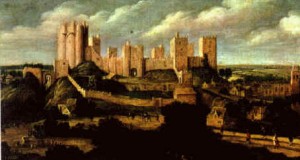
On this day in history, 20th October…
1536 – The yielding of Pontefract Castle – On the night of the 19th October 1536, Thomas Maunsell, Robert Aske and the rebels of the Pilgrimage of Grace threatened an assault on Pontefract Castle and its owner, Lord Darcy. By 8 o’clock on the morning of the 20th October the castle had surrendered to the rebels and its inhabitants – which included the likes of Lord Darcy, Sir William Gascoigne, Sir Robert Constable, Edmund Lee, Archbishop of York, and Thomas Magnus, Archdeacon of the East Riding – had sworn the rebel oath.
M.L. Bush writes that “no force was required: simply a letter from Aske setting out the grievances of the commons and their wish that the lords within the castle would be ‘the mean to the king by way of petition’, followed by a visit to the castle the next morning from Aske when he lambasted the lords spiritual and temporal for neglecting their duty to the commons, especially by tolerating heresy and failing to declare to the king ‘the poverty of his realm and that part specially'”. Lord Darcy replied that they would submit to him on the 21st but Aske insisted on it happening that day, threatening action against the castle otherwise. Darcy surrendered.
Darcy had little choice when there were only around 300 men in the castle and the rebels numbered in the tens of thousands, but Bush makes the point that the castle inmates could have tried to crush the rebels ten days earlier when the rebellion was in its infancy and its numbers much, much smaller. Bush explains that the elderly Lord Darcy actually sympathised with the rebel cause, he “undoubtedly had grave reservations about the government, especially in its policy of suppressing monasteries and its domination by the upstart heretic, Thomas Cromwell, who appeared to be against the nobility and the clergy”. The grievances of the rebels were justified in his opinion and “his hope was that the government would take note and reform its policies accordingly”, however, Darcy did not want to raise a revolt himself or take an active part in one, so he fled to Pontefract Castle and hoped that he would not need to get involved.
Notes and Sources
- The Pilgrimage of Grace: A Study of the Rebel Armies of October 1536, M. L. Bush, p94-96
These rebels certainly angered King Henry VIII and in the series, “The Tudors” he sent his good friend, Charles Brandon, Duke of Suffolk to deal with them. Was Charles Brandon in fact sent in truth??
Yes, he was. If you look at yesterday’s article I have quoted from a letter that Henry sent to Suffolk. The Duke of Norfolk, the Earl of Derby and George Talbot, Earl of Shrewsbury were also involved.
I am interested in the Pilgrimage of Grace as part of my studies. I have noted that many note that the PoG was a revolt whereas Aske describes it as a religious crusade. Your thoughts and comments on this?